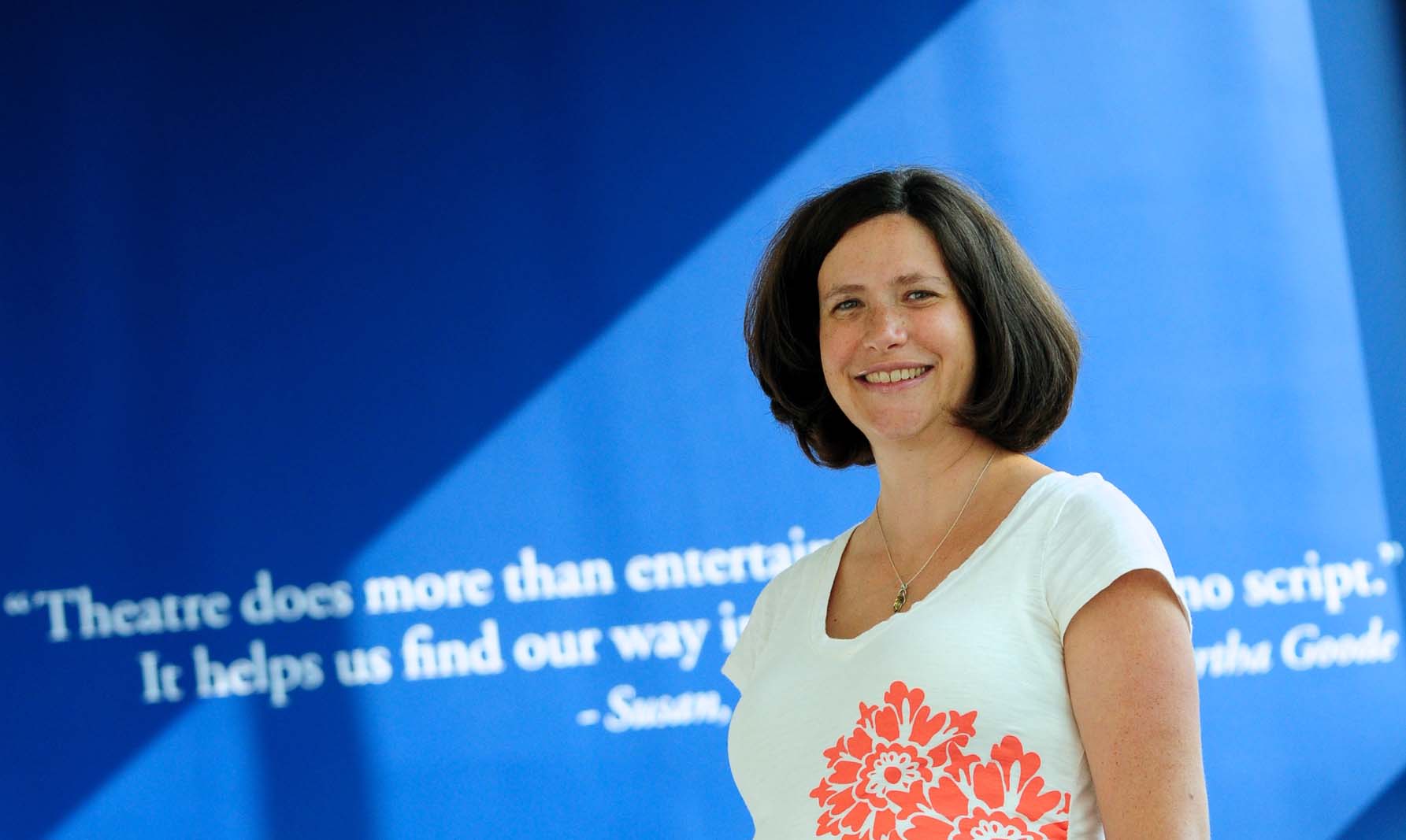Acting Coaching for 'Shy' Researchers? Workshop is Sept. 21
September 10, 2013
Jenifer Alonzo is an assistant professor of communication and theatre arts at Old Dominion University, and you don't have to observe her for long to tab her as an extrovert. Yet, she wasn't always that way, and there is a certain empathy she harbors toward introverts that makes her want to tug scientists, engineers and other researchers into the limelight.
"Many researchers in science and technology are shy," she says. "But actors are often shy, too. My parents forced me into acting classes when I was a child because I was so painfully shy I couldn't connect with people outside of my family."
The average person may accept aloofness as a common trait of scientists and engineers, and perhaps even think of it as an attribute for anyone who must concentrate on esoteric matters. But the focus over the past decade or so on multidisciplinary/interdisciplinary research projects - the sort that may require collaboration between a biologist and a biological engineer, for example - has exposed communication problems among researchers that are a roadblock to progress.
That's why the National Science Foundation (NSF) three years ago gave Alonzo and several colleagues a grant to develop programs that would improve the way people from a wide variety of research fields communicate with each other. The result has been the Interdisciplinary Communication Laboratory for Undergraduate Biology, or iCLUB.
Activities devised by iCLUB, which has since served faculty and graduate students from disciplines as wide-ranging as genetics and geology, have been road-tested at the University of Connecticut Health Center, the National Institute for Mathematical and Biological Synthesis and Murray State University in Kentucky. On Sept. 21, a daylong program will debut in Hampton Roads with an iCLUB Trainers Workshop from 10 a.m. to 4 p.m. at the Goode Theatre on the ODU campus. An affiliation with ODU is not required to attend; anyone interested in attending should contact Alonzo at jalonzo@odu.edu.
Alonzo will lead the workshop and be assisted by two other project investigators from ODU: Holly Gaff, associate professor of biological sciences, and Ginger Watson, associate professor of STEM education and professional studies.
"There is a growing awareness that major advances in research can be made through collaborations across traditional disciplines," Alonzo explained. "But students and faculty involved in these research activities may confront obstacles such as differences in personal values and research values, differences in research practices or overall discomfort with the close interpersonal communication that is critical to any collaboration."
Workshop participants will not simply sit and listen. They will be active participants in exercises commonly used by acting coaches, and that are designed to quickly build rapport and develop the listening skills of participants. At base, the goal is to put two or more people together in a scenario in which they "click," like actors do in a well-received stage play.
"Theater," as Alonzo sees it, "provides the framework to explore being someone else." That someone else doesn't stare at his or her shoes when talking to a colleague and is clear and direct in delivering a message, even when conflict is involved.
To get scientists or engineers to "open up" may require a lot of practice, Alonzo said. "The idea of rehearsal is an important one. We need to create rapport between participants, maybe be a little silly and awkward together. We may cast bad guys and good guys, and then switch roles, get them to act it out. At the end of the day each person can bring real-world problems to the group and everyone can talk about them. The workshop moves slowly, so that everyone can get used to being in a supportive environment - where discussions about conflict are seen as a way to improve collaboration."
Alonzo recounts an incident from one seminar in which a young postdoctoral researcher, whose first language is Spanish, confessed to having problems being assertive with her adviser. The postdoc said she couldn't make eye contact with the adviser. Alonzo suggested that she "act out" a conversation with the adviser, but speak in Spanish, not English. She did and was a totally different person. "She was thrilled and said, 'I haven't felt like this in so long.' I asked her if she could do it now in English, and she said she could. She rehearsed the scene in English and transformed into a confident investigator.
"There is such a transformation when I can get an unassertive person to rehearse being powerful. This rehearsal can serve as a foundation for change in hierarchical workplaces and for researchers who want to become better collaborators, not only with other scientists but with people from across sectors. This is particularly important for scientists who wish to work with, for example, city planners."
Other exercises may involve scenarios in which one party is asked to propose a plan and the other parties are told that when they react they cannot say "no, but." Instead, they must preface their amendments to the plan by saying "yes, and."
"This is a challenging exercise because it forces participants to listen and build even when the conversation goes in an unexpected direction," Alonzo said.
She commends the NSF for realizing that an investment in helping scientists and engineers to improve their interpersonal skills is an investment in tomorrow's technology. "If we not only reduce areas of potential conflict, but also see conflict as something that can improve the work if we enter into listening and responding creatively, then researchers' work is going to get done much faster, and much more efficiently," she said.
She also praises the participants who overcome their initial awkwardness. "The comment I receive most often is, 'I never would have taken this workshop if I had understood what I was getting into, but I am so glad I did.' The feedback I get is that everyone comes away with at least one useful tool."


